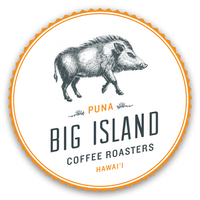Organic and Fair Trade certifications are uncommon in Hawai‘i, but Hawaiian coffees are among the most responsibly grown in the world.
Because our farms are in the United States, all Hawaiian coffee producers must follow strict EPA pesticide regulations, U.S. labor laws, and Hawai‘i’s state-level environmental protections . Most of Hawai‘i’s 1,000+ farms are small, family-run polyculture farms of fewer than 20 acres—nothing like the monoculture plantations common elsewhere.
When pests such as Coffee Berry Borer arrived in 2010, Hawai‘i’s Department of Agriculture approved only biologically based treatments such as Beauveria bassiana, a natural fungus that targets the pest without harming the environment.
“Fair Trade” labels are redundant here—Hawai‘i’s minimum wage and employment laws already ensure fair compensation and safe working conditions. And because we grow only Arabica varieties, all Hawai‘i-grown coffees are naturally non-GMO.
In short, Hawaiian coffee is grown with aloha ‘āina—deep respect for the land, farmers, and community.
Learn more about sustainability in Hawai‘i-grown coffeeshere.
